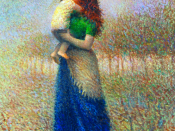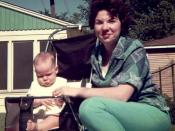It is widely known that motherhood is viewed as the middle purpose to a woman's life. It is her destiny and through that she becomes mature and it is the supreme accomplishment in her entirely life. Women who choose not to have children are regarded as selfish and also, abortion is described as emotionally and psychologically injurious to women. There are also women who are childless with no choice and in the society they are seen as underprivileged. This social 'pressure' to have children is identified as 'motherhood mandate'. Motherhood can also be seen as an 'institution'. The need that women have for children is regarded as 'maternal instinct' and it is both normal and natural. It is obviously that social and cultural perspective has a huge influence in women deciding whether and how to become mother because women are expected to adapt to certain social norms and principles about motherhood.
For instance a certain perspective of the 'perfect mother' is that she should be married, heterosexual couple, with her husband going to work and bring money to home, and her staying at home to raise 'her' children with the appropriate way and also to care her husband.
Normally, the first adults with whom infants interact are their parents. As many studies of John Bowlby (1953) have shown, a close relationship is very important for infants' social development. This relationship which Bowlby called 'attachment' is a social and emotional bond between infant and the carer that spans both time and space. It involves both the warm feelings that the parent and the child have for each other and the comfort and support they provide to each other which becomes especially important during times of fear and stress. In most cases one of the parents serves as the primary carer of...


